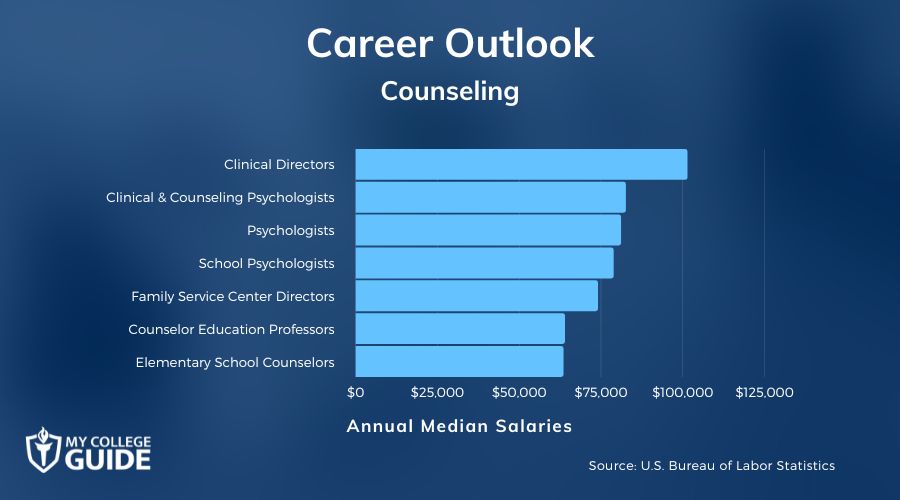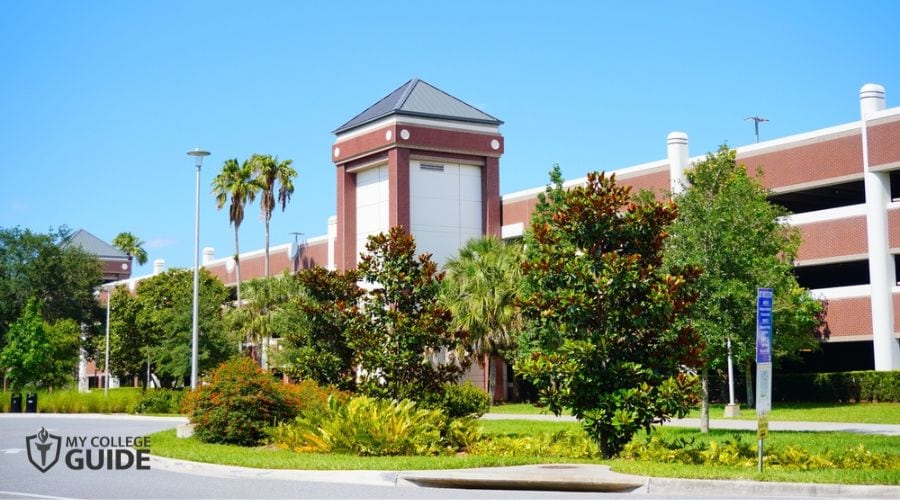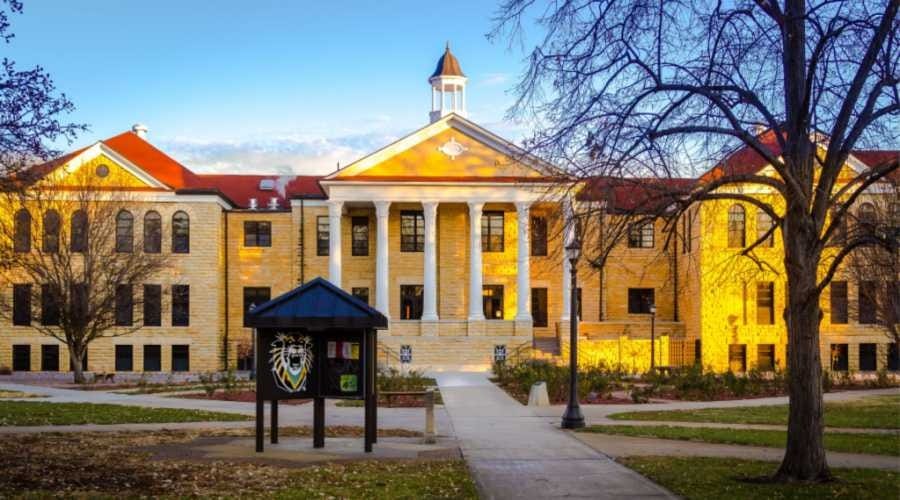For those who want to build a rewarding career helping others through challenging life circumstances, considering online counseling degrees may be the perfect first step to your journey.

Online programs offer flexibility and affordability depending only on your current personal situation. For example, if you are a caretaker, you can pursue your degree from the comfort of your own home.
Editorial Listing ShortCode:
Through the variety of advanced degree programs available in counseling, you will be able to learn the specialized skills needed to make a difference in your community.
Online Counseling Degrees
In order to work within the specialized field of mental health counseling, it is generally required for licensed counselors to hold a graduate-level degree.
Although there is overlap between some of the different degrees that fall under the counseling umbrella, there are a wide variety of specializations to choose from. Some of the most common ones are discussed below.
Select the program that most interests you to jump to that section of the guide:
- Online Addiction Counseling
- Online Behavior Analysis
- Online Career Counseling
- Online Child and Adolescent Counseling
- Online College Counseling
- Online Counseling (General)
- Online Counselor Education
- Online Marriage, Couple, and Family Counseling
- Online Mental Health Counseling
- Online Rehabilitation Counseling
- Online School Counseling
- Online Substance Abuse Counseling
The program that’s best for you will depend on your personal interests and professional goals.
Addiction Counseling

Addiction counseling degrees typically help students prepare to pursue roles as addiction counselors post-graduation. These jobs generally help people addicted to drugs or alcohol put systems in place to improve their life and give up addictive substances.
Editorial Listing ShortCode:
These degrees may also teach students how to work with people who deal with substance abuse or broader mental health challenges. They may teach students how to identify, discuss, and safely treat a variety of addictions.
In these types of counselor degree programs, students may study topics such as the history of addiction counseling, the psychological and neurological behaviors behind addictions, and the role familial networks play in helping a patient.
Behavior Analysis

The field of behavior analysis, also called applied behavior analysis, dives into what makes people act the way they do. Professionals in the field typically focus on how to guide their patients toward certain behaviors, and what factors may help them along the way.
Editorial Listing ShortCode:
These online masters degrees in counseling may help bring a unique perspective to a variety of counseling and therapy-related roles. They may also teach valuable skills that graduates may use to pursue roles in human resources, recruiting, sales, or consulting.
Students in these programs typically take classes on intervention tactics, behavior theories, environmental factors on a person’s actions, and how to create treatment plans, among others.
Career Counseling

Careers counselors aim to help students in school figure out what they want to do with their lives professionally, and to give new graduates advice and direction. They may also help current professionals re-route their careers if needed.
In a master’s degree in counseling program with a focus on career counseling, students typically learn about different theories in the field. They may also study how career counselors can have different roles in various institutions, and strategies to set their clients up for success.
Editorial Listing ShortCode:
Masters career counseling programs may provide opportunities for students to get involved in internships, fieldwork, or research.
Child and Adolescent Counseling

Counselors can be an important part of children’s and adolescents’ lives, and masters degrees in child and adolescent counseling may help prepare students to pursue these types of roles. They may also provide students with a general masters-level education in mental health.
Editorial Listing ShortCode:
Students may study topics like attention disorders, emotional trauma, learning difficulties, and other issues that may impact children. They may also learn about issues that teenagers face, like eating disorders, peer pressure, and anxiety. Child and adolescent counselors may work in a variety of settings, such as hospitals, private practices, and outpatient care centers.
College Counseling

College counselors help college students navigate their coursework, as well as difficult social or emotional situations. They may also help college students figure out what they want to do after they graduate.
A master’s degree in counseling with a focus in college counseling will typically teach students the background of the field, as well as signs of trauma and mental disorders in college students. It may also cover the effects the college-level educational system can have on students.
Editorial Listing ShortCode:
Online masters degrees in counseling that focus on college may also cover other areas of counseling, like substance abuse, addiction, rehabilitation, and more.
Counseling (General)

A general counseling degree may cover the foundational theories and history of the field, as well as a little bit of every specialty. Students may take classes in school, marriage and family, career, addiction, and other sectors of counseling.
Online masters programs in counseling generally teach students how to identify, analyze, and discuss patient behavior. They may also learn how to come up with treatment plans, and may get opportunities to practically apply their knowledge through internships or capstone projects.
Editorial Listing ShortCode:
With a general degree in counseling, graduates may choose to pursue a doctorate in a specific area of the field, or work toward a role as a counselor.
Counselor Education

Counseling masters programs online with a specialty in counselor education generally teach students how to work as educators in the counseling field. This may include jobs as teachers, supervisors, coordinators, and administrators.
Students in these types of masters programs may learn techniques to support their students, a variety of counseling theories, different learning methods, and more. They may study methods to teach and supervise other counseling professionals.
Editorial Listing ShortCode:
While most other graduate counseling degrees are focused on the profession itself, this degree in particular covers skills related to teaching and building a curriculum.
Marriage and Family Counseling

Counselor degree programs with an emphasis on marriage and family counseling primarily work with couples and families, focusing on how to create and maintain a healthy family unit. They may see each family member separately, or the couple and family in sessions together.
Editorial Listing ShortCode:
Classes in these types of degree programs typically cover different factors that could influence the wellbeing of a family, including cultural, societal, and emotional ones. They may also teach students how to make assessments and analyses of behavior. These programs may provide opportunities for students to work with couples and families to practically apply their knowledge and come up with treatment plans.
Mental Health Counseling

Mental health counselors help their patients address a variety of challenges related to mental health, including disorders, behaviors, and addiction. A masters degree in counseling online with a focus on mental health may help students prepare to pursue a career in this field.
Editorial Listing ShortCode:
Students in these types of programs may study a variety of disorders and learn how to help patients in crisis situations, or those who have experienced mental or emotional trauma. They may also learn how to identify the symptoms of different types of mental health challenges.
While in a mental health counseling program, students may get the chance to evaluate patients and create treatment plans that they can review with their professors.
Rehabilitation Counseling

A degree in rehabilitation counseling aims to help prepare students to pursue careers as rehabilitation counselors. These roles assist patients in recovering from life changes or mental and emotional trauma.
This field can overlap with other counseling sectors. For example, rehabilitation counselors may help patients recover from a drug addiction or alcohol abuse. They may also help patients recover from a difficult life event, such as a death in the family.
Editorial Listing ShortCode:
Graduate programs in this field teach students about how to create and administer treatment plans. They also show them how to identify symptoms of trauma and methods to help people cope.
School Counseling

School counselors usually work in elementary, middle, or high schools, and help their students through a variety of academic, mental, and emotional challenges. They may assist them when it comes to choosing classes and extracurriculars.
Editorial Listing ShortCode:
These types of counselors may also create educational materials and teach sessions on mental health to students in the classroom. They may host after-school programs or give presentations at assemblies on similar topics. In a graduate program, students may learn about child and adolescent development, symptoms of trauma, intervention techniques, and more. They may also learn some teaching skills.
Substance Abuse Counseling

Substance abuse counselors have a similar role to addiction counselors because they both help patients who have struggled with drugs and alcohol. These types of counselors aid patients who have trouble with overusing harmful substances.
To learn to help patients with these kinds of issues, students in a graduate substance abuse counseling program may take classes in intervention, treatment, disorders, addiction, and more. They may learn how to craft treatment plans and effectively communicate with patients.
Editorial Listing ShortCode:
These types of programs may also teach students ethical practices and legal guidelines for working as a substance abuse counselor.
Counseling Careers & Salaries

There are several fields within the world of counseling in which you can choose to specialize. Whether you have a passion for helping children and families or you would like to work with disadvantaged populations and addiction, there are a number of ways you can utilize your online counseling degree in this challenging career field.
Below we have highlighted a few of the most common occupations in the field of counseling, as well as their median annual salaries according to the U.S. Bureau of Labor Statistics. This information will give you an idea of what to expect after graduation from your counseling degree program:
| Careers | Annual Median Salaries |
| Clinical Directors | $101,340 |
| Clinical and Counseling Psychologists | $82,510 |
| Psychologists | $81,040 |
| School Psychologists | $78,780 |
| Family Service Center Directors | $74,000 |
| Counselor Education Professors | $63,910 |
| Elementary School Counselors | $63,460 |
| Public Health Social Workers | $60,840 |
| Education Counselors | $60,510 |
| Family Therapists, Outpatient | $57,930 |
Due to the increased awareness of the importance of mental health and expanded insurance coverage for counseling services, the overall career outlook for those interested in working within the field of counseling is very positive.
It is a wise idea to look at reputable sources, such as the BLS, to determine the specific occupational growth and salary information of the counseling specialty you are interested in pursuing. According to the BLS, marriage, and family therapists can expect to see a 14% occupational growth over the next 10 years.
During this same time frame, employment for school and career counselors will grow an estimated 10%, and substance abuse and behavioral disorder counselors will grow an estimated 22%. The annual salary for those who work as a counselor varies based on their specialty, educational level, and professional experience.
View our list of the top 40 Counseling careers to compare jobs and salaries in this field.
Online Counseling Masters Curriculum & Courses

Your curriculum in counselor degree programs may vary, but here are a few courses that you may come across.
- Human Development Throughout the Lifespan: You’ll learn about different theories and research about human development at different life stages.
- Couples and Family Counseling: This class teaches students about the effects of disorders and trauma on couples and families as a whole.
- Public/Private Policy and Counseling: You’ll learn about the impact that public and private policies have on patients, and how they determine the guidelines counselors follow.
- Counseling and MFT Theories I: This course covers different philosophies related to counseling, and a variety of cultural perspectives.
- Diversity in Counseling: You’ll learn about bias, microaggressions, and other peoples’ backgrounds to promote diverse counseling practices.
- Multidisciplinary Facilitation: This class teaches students how to work in groups and collaborate with other counselors in different teams and environments.
- Substance Use Disorders and Process Addictions: You’ll learn about the history and current theories related to identifying and treating addiction.
- Mental Health Recovery: This course dives into the relationship between a patient and a mental health counselor, and how a counselor can impact a patient in recovery.
- Prevention and Intervention of Crisis and Trauma: You’ll learn about how various types of crises and trauma can affect a person, and what a counselor can do to help.
- Use of Technology in Counseling: This class focuses on how different types of technology can be used to help counselors and patients.
Along with classes like these, graduate counseling students may get the chance to participate in internships, research projects, capstone projects, and more.
How to Know If a Degree in Counseling is Right for Me?

There are several factors to take into consideration when you are determining whether you should pursue your degree in counseling online or at a traditional campus.
Editorial Listing ShortCode:
With advancements in technology, students who take online classes are able to receive the same high-quality education as on-campus students, but they also have the added flexibility of logging into their courses at times that fit their busy schedules.
If you choose to enroll in an online counseling degree program, there are several advantages to working toward your degree through distance learning, including:
- Ability to choose a concentration within your counseling degree
- Full access to advanced educational platforms that allow you to connect with students and instructors across the country
- Flexible scheduling options for coursework and in-field requirements
- Potential for lower tuition costs and options to accelerate your degree program
An important factor to consider is that many online degree programs still require students to complete in-person practicums, internships, or field studies in order to meet the graduation requirements. Be sure to check into your school’s unique policies before enrollment to ensure that you will be able to meet these course expectations.
How to Choose an Online Degree in Counseling Program

The information below is a great starting point for questions you should ask before committing to enrollment within a degree program:
- Accreditation: Accreditation is an essential aspect of a reputable online accounting degree program. Check to see if your chosen school is accredited.
- Student-to-Faculty Ratio: With smaller class sizes, students will be able to have a more personalized educational experience and receive a greater level of support and connection from their instructors and classmates.
- Academic Advising and Student Services: A solid educational foundation goes beyond the textbook, and many of the top universities that offer online counseling degrees provide distance learning students with additional support services to help them succeed.
- Cost: The cost of each program is also an important factor. Compare various programs to see which one fits your budget.
- Degrees Offered: Be sure to check with each school you are considering to ensure they offer your chosen degree program. Also, compare the various programs’ coursework to ensure the coursework fits with your desired career goals.
When deciding on an online counseling degree program, there are many aspects of your education that are important to consider including which program fits your schedule and expectations.
Admissions Requirements

The admissions requirements for a masters degree in counseling may vary, but these are a few you’ll typically see.
- Bachelor’s degree
- GRE or GMAT scores (only some schools require them)
- Personal statement
- Letters of recommendation
- Undergraduate transcripts
Some schools may want to see that you majored in a relevant field as part of your undergraduate education, such as counseling or psychology. Certain schools may also want to verify your undergraduate GPA through your transcripts.
Counseling Ongoing Education

If you are interested in working as a counselor, you likely have a number of questions as to the type of online degrees you will need. Typically, the minimum requirement to get started in the field is a bachelor’s degree, and an online masters degree in counseling is common among those who work as licensed counselors.
Online bachelor’s degrees in counseling can help develop your communication, empathy, and emotional intelligence skillset that can be used to market yourself as an entry-level practitioner in the workplace. Certain careers within the field of counseling require a doctorate-level degree, and there are accredited programs that offer online doctorate degrees in counseling.
Editorial Listing ShortCode:
There are three types of doctoral degrees that you can pursue when choosing a counselor degree online, including the Doctor of Philosophy (PhD), Doctor of Psychology (PsyD), and Doctor of Education (EdD).
Online Counseling Programs Accreditation

A counseling degree program is considered accredited after the college has undergone a voluntary review of its educational curriculum by one of the recognized accrediting agencies.
This is an essential factor to consider when pursuing your counseling degree, as non-accredited degrees may not be recognized when it is time for you to pursue licensure or professional employment. Be sure to check that your school has regional accreditation that is recognized by the U.S. Department of Education.
CACREP Accreditation
The Council for Accreditation of Counseling and Related Educational Programs is the programmatic accreditation for counseling. The council reviews masters and doctoral programs.
For a program to become accredited, it must be stable and cover all the information and skills needed to meet the council’s standards. It may be a strategic move to attend a school accredited by this organization to ensure that you’re receiving a quality education. To learn more, visit the council’s website.
Counseling Licensure and Certifications

The question of whether you need a license after completing your master degree in counseling online or not depends on the type of counseling career that you wish to pursue as well as your state’s specific regulations. Volunteer or entry-level counseling positions may not require you to hold a professional license.
If you wish to work as a professional counselor or specialize in a specific counseling focus, such as marriage and family counseling, it is generally required that you obtain licensure. The minimal education level that allows counselors to take licensure exams varies based on your state’s regulations.
While you may be able to obtain a counseling license after completing a bachelor’s degree program, it is often required that professional counselors hold a master’s or doctorate-level degree before practicing within their field.
Financial Aid and Scholarships

If you’re interested in looking into financial aid options, you can check them out at the Federal Student Aid website. There are a variety of options qualifying students can apply for, including scholarships, grants, loans, work-study programs, and more.
Graduate students may be able to apply for direct unsubsidized loans. With these types of loans, students don’t need to show financial need to qualify, and they are responsible for paying back all of the interest.
What Can You Do With a Counseling Degree?

According to the Bureau of Labor Statistics, there are a wide variety of counseling careers that graduates may choose to pursue with a masters in counseling. A student’s specialization may help guide them in the direction of a specific sector of counseling.
Graduates may choose to pursue roles as marriage and family therapists, rehabilitation counselors, school counselors, career counselors, and more. They may also work toward careers as substance abuse, behavior disorder, and mental health counselors.
What Are the Requirements to Be a Counselor?

The requirements to be a counselor may vary slightly, depending on what type of counselor you’re looking to become, but they typically include these.
- Education: You’ll generally need to earn a master’s degree in counseling from a program accredited by the Council for Accreditation of Counseling and Related Educational Programs.
- Exam: You’ll need to complete an exam to receive a state license.
- Supervised Postgraduate Hours: You’ll work a certain number of these types of hours.
You may also need to complete a background check, or any additional state requirements.
How Long Does It Take to Get a Counseling Degree Online?

It can take as little as one year to complete an online counseling degree. This timeframe assumes you’re attending a 36-credit hour program that doesn’t have a thesis requirement. You would also need to go to school full-time and year-round, including during the summer.
Editorial Listing ShortCode:
If you attend classes part-time, or if your program requires a thesis, it may take longer than one year to graduate. Taking summers off will also extend the length of your masters degree.
What’s the Difference Between Counseling vs. Therapy?

While there is plenty of overlap between counseling and therapy, here are a few key differences between the two fields, including these below.
| Counseling | Therapy |
|
|
In general, therapy emphasizes finding patterns of behavior, while counseling looks to help resolve a specific issue in someone’s life.
What’s the Difference Between Social Work vs. Counseling Degrees Online?

Social work and counseling are fairly similar fields, but they are quite different in the way they help their clients.
| Social Work | Counseling |
|
|
While a social work degree may teach students some counseling and therapeutic techniques, they typically have a broader focus that can include criminology, public health, and more.
Is a Counseling Degree Worth It?

Yes, a counseling degree is worth it for many students. Counselors pour a lot of their energy into helping people, so many professionals find it to be an extremely rewarding career.
Editorial Listing ShortCode:
There are also a wide variety of different types of counselors, so students may be able to pursue the area that interests them the most. Those who hope to work with families, for example, may be able to study marriage and family counseling, which according to the BLS will see a 14% job growth over the next 10 years. Others may prefer addiction counseling, which is expected to see a 22% job growth.
Universities Offering Online Bachelors in Counseling Degree Programs
Methodology: The following school list is in alphabetical order. To be included, a college or university must be regionally accredited and offer degree programs online or in a hybrid format.

Arizona State University offers an online program for a Bachelor of Science in Counseling and Applied Psychological Science. Potential courses include Theories of Counseling and Psychotherapy, Counseling Skills, and Self in a Multicultural Society. The curriculum consists of 40 courses for a total of 120 credit hours. Classes typically run for 7.5 weeks each.
Arizona State University is accredited by the Higher Learning Commission.

Capella University offers a Bachelor of Science in Psychology program online with a concentration in Pre-Counseling. The curriculum typically teaches concepts such as lifespan development, psychology of personality, advocacy with diverse populations, and abnormal psychology. Credit for prior learning may be granted for knowledge gained through professional experiences, training, and industry certifications.
Capella University is accredited by the Higher Learning Commission.

Clarks Summit University offers a Bachelor of Science in Counseling program online. The program seeks to develop interpersonal skills, teach important psychological concepts, and model counseling practice from a biblical worldview. The program is designed to help prepare for entry into careers such as school counselor, rehabilitation director, social worker, guidance counselor, or substance abuse specialist.
Clarks Summit University is accredited by the Middle States Commission on Higher Education.

Crown College offers a Bachelor of Science in Psychology and Counseling program online. The program offers individualized academic advising, small class sizes, and a Christ-centered approach to teaching. Courses tend to cover topics like group dynamics, statistics, developmental psychology, crisis intervention, personality theories, and marriage and family counseling. Classes are typically 8 weeks long each.
Crown College is accredited by the Higher Learning Commission.

Drexel University offers a Bachelor of Science in Behavioral Health Counseling program online. The program is designed to help prepare for counseling roles in settings like addiction counseling, psychiatric rehabilitation, child support services, case management, and residential services. Up to 135 of the 180 required credits may be transferred in from accredited outside institutions.
Drexel University is accredited by the Middle States Commission on Higher Education.

East Central University offers a Bachelor of Arts in Human Services Counseling program online. Concentrations include Counseling and Rehabilitation. Classes are typically 8 weeks long each. On average, the required 124 credit hours are completed in 2 to 4 years depending on prior educational experience.
East Central University is accredited by the Higher Learning Commission.

Faulkner University offers an online program for a Bachelor of Science in Counseling Psychology. The program is designed to prepare for entry into non-licensure counseling roles. Common classes include Psychology of Religion and Spirituality, Research Methods, Abnormal Psychology, and Human Systems Dynamics.
Faulkner University is accredited by the Southern Association of Colleges and Schools Commission on Colleges.

The online program for a bachelor’s in Sociology at Fort Hays State University offers a concentration in Addictions Counseling. Depending on professional and educational goals, the program can be completed as a Bachelor of Arts or Science. The curriculum aims to teach topics like group counseling, pharmacology, client management, psychopathology of addictions, and ethics.
FHSU is accredited by the Higher Learning Commission.

Grand Canyon University offers a Bachelor of Science in Counseling program online. The program offers specializations in Childhood and Adolescence Disorders, Christian Counseling, Marriage and Family Therapy, and Trauma. Completing the program may qualify for non-licensure counseling roles or post-graduate studies in psychology.
Grand Canyon is accredited by the Higher Learning Commission.

Houston Christian University offers a Bachelor of Arts in Psychology with a concentration in Christian Counseling.
Courses typically teach topics like statistics, human growth and development, history of psychology, and cognitive, social, cultural, and abnormal psychology. This program combines foundational psychological theories and counseling skills with a unique Christian perspective. The completion of 125 credits is required.
Houston Christian University is accredited by the Southern Association of Colleges and Schools Commission on Colleges.

Indiana Wesleyan University offers a Bachelor of Science in Addictions Counseling program online. An in-person field internship is required. The program is designed to teach skills needed to work in the court system, domestic violence shelters, inpatient facilities, and departments of correction. On average, the 16 required major courses are completed in about 22 months.
Indiana Wesleyan University is accredited by the Higher Learning Commission.

Liberty University offers a Bachelor of Science in Psychology program online. The Christian Counseling specialization is designed to prepare for providing support to clients with a faith-based approach. Classes usually span 8 weeks each. The 120 required credit hours are commonly completed in 3.5 years when studying full-time.
Liberty University is accredited by the Southern Association of Colleges and Schools Commission on Colleges.

Methodist University offers a fully online program for a Bachelor of Science in Psychology. The program is designed to help prepare for entry into careers such as assistant behavior analyst, business administrator, case manager, human resources manager, and rehabilitation specialist. Up to 93 approved credits may be transferred in from accredited outside institutions.
Methodist University is accredited by the Southern Association of Colleges and Schools Commission on Colleges.

New Mexico State University offers a Bachelor of Science in Counseling and Community Psychology program online. The program is designed to help build therapeutic skills under the supervision of licensed professionals. The program aims to help prepare for careers such as behavioral health technician, community case worker, mental health paraprofessional, rehabilitation counselor.
NMSU is accredited by the Higher Learning Commission.

Nicholls State University offers an online program for a BA in Psychology with an emphasis in Pre-Counseling. While completing the program does not qualify for licensure, it aims to prepare for post-graduate studies or entry-level paraprofessional roles. The program also offers a 480 hour internship with an agency in the field of social services or related industry.
Nicholls State University is accredited by the Southern Association of Colleges and Schools Commission on Colleges.

Ohio Christian University offers an accelerated online program for a Bachelor of Arts in Substance Abuse Counseling. Common courses include Psychopharmacology, Case Management, Diagnostic Evaluation and Personal Assessment, and Spiritual Dimensions of Illness and Recovery. The program is designed to meet the requirements for chemical dependency counseling education.
Ohio Christian University is accredited by the Higher Learning Commission.

Ottawa University offers a Bachelor of Science in Addiction Counseling program online. This program aims to teach an understanding of alcoholism, chemical dependence, substance use disorders, harm reduction, and dual diagnosis. The program aims to provide skills needed in careers such as substance abuse counseling, social work, outpatient mental health coordination, and probation.
Ottawa University is accredited by the Higher Learning Commission.

Regent University offers an online program for a BS in Psychology. The concentration in Clinical and Counseling Psychology is designed to help pursue counseling licensure or to work in clinical mental health settings. Common courses include Personality Theories, Marriage and Family, and Physiological Psychology.
Regent University is accredited by the Southern Association of Colleges and Schools Commission on Colleges.

Saint Leo University offers a Bachelor of Arts in Clinical Psychology and Counseling. Classes meet primarily online, but clinical internships that provide hands-on experience in fields such as aging, autism, addiction, clinical research, children’s services, and victim advocacy are encouraged. Potential courses include Abnormal Psychology, Interviewing and Counseling Skills, and Personality Theory.
Saint Leo University is accredited by the Southern Association of Colleges and Schools Commission on Colleges.

Southwestern Assemblies of God University offers a Bachelor of Arts in Human Services program online. Students can select a specialization in Counseling, Psychology, Social Work, or Criminal Justice. The program is designed to provide skills needed to work in entry level human service career fields. Qualified transfer credits may be awarded for relevant educational and professional experience.
SAGU is accredited by the Southern Association of Colleges and Schools Commission on Colleges.

Toccoa Falls College offers a Bachelor of Arts in Counseling Psychology program online. The program is designed to help pursue non-licensure roles in settings like social work, counseling, or ministry. The 126 credit curriculum tends to teach topics like crisis intervention, marital counseling, Christ-centered treatment, and abnormal psychology.
Toccoa Falls College is accredited by the Southern Association of Colleges and Schools Commission on Colleges.

Trinity International University offers an online program for a BA in Psychology. The Counseling Psychology concentration aims to provide a foundation to pursue additional professional training and to prepare for graduate school, the workplace, and helping the community.
Trinity International University is accredited by the Higher Learning Commission.

The University of Cincinnati offers a Bachelor of Science in Substance Abuse Counseling program online. With a previously earned associate degree, an additional 60 credit hours are required. Admissions are typically offered for fall, spring, and summer terms. The program may be completed in 3 years.
UC is accredited by the Higher Learning Commission.

The BS in Organizational Leadership and Learning at the University of Louisville offers a concentration in Counseling and Human Relations. Classes meet online and tend to be 8 weeks long each. Up to 90 approved credits from accredited outside institutions may be transferred into the program.
The University of Louisville is accredited by the Southern Association of Colleges and Schools Commission on Colleges.

The University of South Dakota offers a Bachelor of Science in Addiction Counseling and Prevention program online. Specializations are available in Prevention and in Treatment studies. The curriculum spans 120 credits and aims to teach topics like dependency, withdrawal, professional ethics, and family systems.
USD is accredited by the Higher Learning Commission.
Getting Your Degree in Counseling Online

For those with a passion for helping others and a desire to support individuals in working through challenging life circumstances, a masters in counseling online is an excellent starting point to enter this rewarding field.
Through graduate studies and professional licensing, you will have the chance to specialize within your specific field of interest and make a difference within your community, one person at a time.
If you’re ready to take the next step in your journey, you can start researching accredited online masters in counseling programs to find the right one for you.
